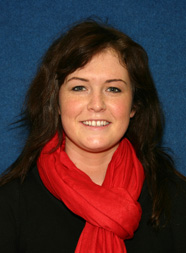 PhD candidate Kate Vick gave her exit seminar at the UOC Research Seminar Series in the Beaven Lecture Theatre this afternoon.
PhD candidate Kate Vick gave her exit seminar at the UOC Research Seminar Series in the Beaven Lecture Theatre this afternoon.
Kate explained how cancer cells are often said to exist in a highly oxidising environment, which is thought to be due to alterations in metabolism, increased NADPH oxidase activity, and transient hypoxia. A lot of the evidence is from endpoint biomarkers of oxidative damage in cancer; these are not particularly sensitive. In contrast, Peroxiredoxin are very sensitive to oxidation by hydrogen peroxide and can be used to detect subtle disturbances within localised areas of cell that may not result in cell damage.
For her PhD, Kate investigated peroxiredoxin 1, 2 and 3 expression and the redox in each of the National Cancer Institute Sixty (NCI-60) panel of cell lines. The NCI-60 is a broad group of 60 cell lines derived from 9 tumour types: leukemia, lung, colon, CNS, melanoma, ovarian, renal, prostate, and breast. The peroxiredoxin expression was constant across the different tumour types.
Kates says that interestingly, peroxiredoxin 1, 2 and 3 were mainly reduced, contradicting the original hypothesis that cancer cells are under increased stress and suggests they are capable of maintaining a reducing environment.
Professors Mark Hampton and Christine Winterbourn are Kate's PhD supervisors. She will graduate this weekend.
